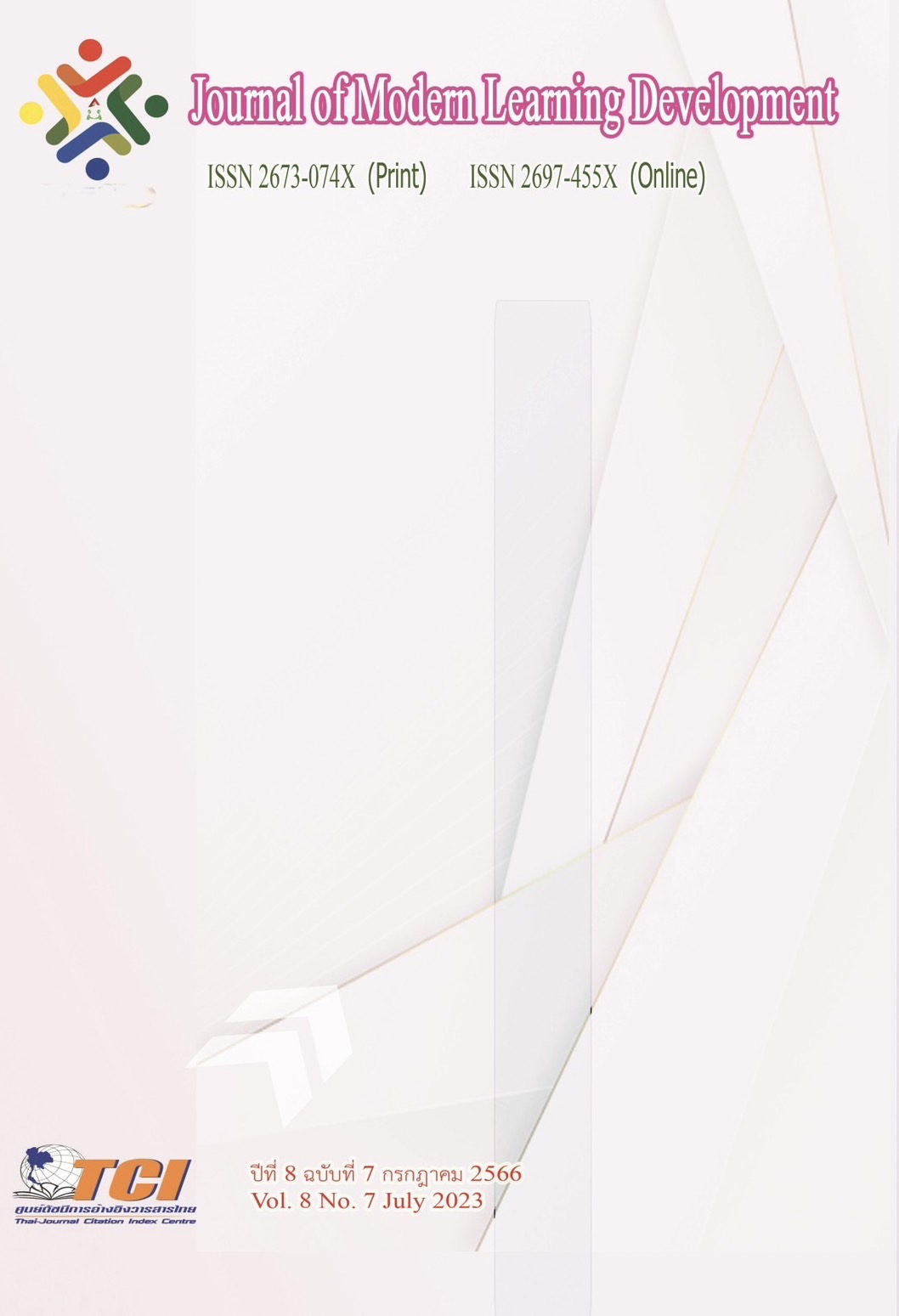Exploring Intercultural Communication Competence Perceptions and Integration into Classroom Practices of Chinese English Teachers at a Chinese Middle School in Shanxi
Main Article Content
บทคัดย่อ
The recognition of intercultural communication competence (ICC) has prompted the Chinese government to require teachers of English to acquire it so as to develop their students. This study explored the extent to which Chinese English teachers perceived their own ICC and integrated it into classroom practices. Forty-seven teachers purposively recruited from a middle school in Shanxi assessed their own ICC through a questionnaire; then five of them voluntarily participated in semi-structured interviews. To a very high extent, they thought they had the ability to understand and respect the excellent cultural traditions of other countries, communicating and interacting with people from different cultural backgrounds, and adapting to the needs of China's social, economic, and technological development and international interactions. They also thought they integrated ICC into classroom teaching to a very high extent, providing cultural activities and timely feedback to their students. These findings fulfilled the Chinese government’s policy and implied that the levels of their ICC perception and integration were influenced by self-improvement activities in their leisure time and the advanced teaching facilities provided by the school. The same study can be replicated in other middle schools where they can promote their teachers’ positive attitudes toward developing and teaching ICC.
Article Details
เอกสารอ้างอิง
Ayon, N. S. (2016). Telecollaboration and Intercultural Communicative Competence. International Journal of Language and Applied Linguistics, 2 (1), 96-122.
Retrieved from: https://www.academia.edu/362172/
Arasaratnam-Smith, L. (2017). Intercultural Communicative Competence. The International Encyclopedia of Intercultural Communication, 1-13. DOI: 10.1002/9781118783 665.ieicc0003.
Byram, M. (1997). Teaching and Assessing Intercultural Competence. Beijing: Foreign Language Education and Research Press.
Byram, M. (2017). Intercultural Communication and International Chinese Language Teaching. Beijing: Foreign Language Education and Research Press.
Creswell, J. (2012). Research Design. California: SAGE Publication.
Chinese Ministry of Education, (2013). The Full-time Middle School English Syllabus. Beijing: Beijing Normal University Press.
Chinese Ministry of Education, (2017). The English Curriculum Standard for Compulsory Education. Beijing: Beijing Normal University Press.
Dong, X. (2020). The Development of English Teachers' Intercultural Awareness in Secondary Schools. Explorations and Echoes, 18, 108-109.
Duisembekova, Z. (2021). Beliefs about Intercultural Communicate Competence: The Development and Validation of a New Instrument. International Journal of Instruction, 14(2), 103-116. DOI: 10.29333/iji.2021.1427a.
Fernández-Benavides, A. (2019). Intercultural Components in the Multimodal Structure of a Language Learning Website. Issues in Teachers' Professional Development, 21(1), 59-74. DOI:10.15446/profile.v21N1.69951.
Gao, Y. (2014). A Theoretical Framework for the Construction of on Intercultural Communication Assessment System for Chinese University Students. Foreign Language, 4, 80-88.
Ge, Y., & Zhang, H. (2021). Cultivation of Teachers' ICC in the Perspective of Internationalization of Higher Education. Super Star Journal, 22, 170-173.
Hu, X. (2021). A Study of the Cultural Content in High School Textbooks of the Humanities Education Edition. Master Degree Thesis. Shanghai: Shanghai Teachers' University.
Johnson, B., & Larry, Christensen. (2016). Quantitative Qualitative and Mixed Methods in Educational. Chongqing: Research Chongqing University Press.
Karchru, B. (1985). Standards, Codification and Sociolinguistic Realism: the English Language in the Outer Circle. Beijing: Foreign Language Education and Research Press.
Liang, H. (2019). A Survey of Senior High School Students' Intercultural Communication, Master Degree Thesis. Jiangsu: Jiangsu Normal University.
Li, L. (2019). A Case Study of Intercultural Communication among Junior High School Students in Chengdu. Master Degree Thesis. Chengdu: Sichuan Normal University.
Singhanat, N., & Anyada, J.(2020)Intercultural Communication and Strategies for the Thai Undergraduate Hotel Interns. PASAA, 59, 204-235.
Tu, W. (2020). A Survey on the Current Situation of High School English Teachers' Intercultural Communication Competence in Huanggang City. Master Degree Thesis. Hubei: Huanggang Normal University.
Wang, L. (2015). A Research on Experiential Culture Teaching in Junior Middle School English Class. Master Degree Thesis. Hangzhou: Hangzhou Normal University.
Xu, Z. (2018). A Study on the Current Situation of Middle School English Teachers' Intercultural Communication Competence. Master Degree Thesis. Chongqing: Chongqing Sanxia Institute.
Zheng, X. (2019). Review and Prospects of Research on Intercultural Foreign Language Teachers at Home and Abroad. Foreign Language World, 193, 85-93.
Zhong, Y. (2020). A Review of Research on Intercultural Communication Competence. Overseas English, 11, 60-62.


